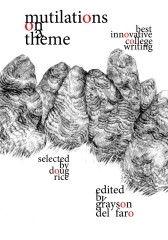Mutilations on a Theme, Ed. by Grayson Del Faro, Jaded Ibis Press, 2015.
Authored by Grayson Del FaroContributions by Matthew Weinkam, Kylee Cook, David Tarleton, Isaac Weil, Melanie Page, Daniel Roche, Theresa O'Donnell
Drawings by Madeline Waits
Semi-finalists were college students at the time their work was selected by editorial assistant, Leon Baham. Author Doug Rice selected the competition winner and finalists.
Featuring the winning submission, “The Boy. The Box,” by Kylee Cook.
Finalists: Theresa O’ Donnell, Melanie Page, Daniel Roche, David Tarleton, Isaac Weil, and Matthew Weinkam. With additional art by Madeline Waits. Book editor: Grayson Del Faro.
from an interview with winner, Kylee Cook:
Q: What would be your advice to the new generation of experimental writers entering into college?
A: I wish someone had told me to take my time. When I started college I wanted to be an established writer already, skip the slog of hard work to just get to the end. As a result I rushed a lot of things: any time someone mentioned a writer’s name I furiously read everything they wrote or the second I finished a decent draft of a story I’d send it off to every magazine I could.... Now I realize that there is not some magic day when you become a writer; there are always books you haven’t read and stories you haven’t written. The process of reading and writing is what makes a writer a writer and the care with which you complete your task is the measure of your worth. I still have that impulse to just consume but I’m learning to curb it with patience. Now I tell myself: do fewer things and do them better.


No comments:
Post a Comment
Note: Only a member of this blog may post a comment.